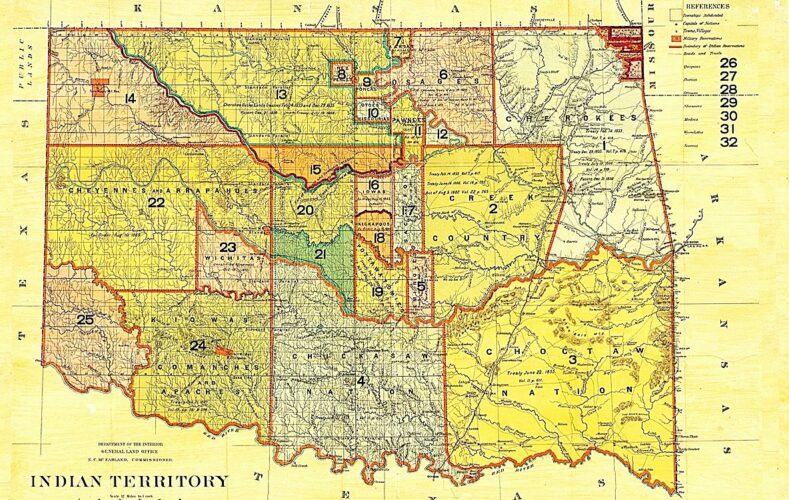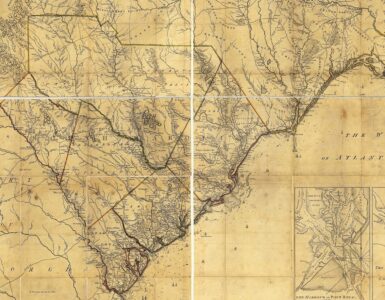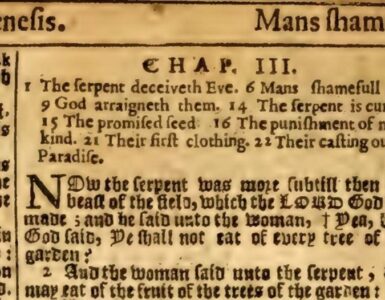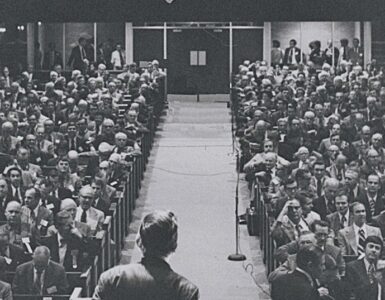From the very earliest days of Presbyterianism in Colonial America there were ministers involved in evangelism among their Indian neighbors. One missionary was Presbyterian minister David Brainerd who established a church for Indians near Freehold, New Jersey, but his ministry was short-lived because he died of tuberculosis when but twenty-nine years old. Jonathan Edwards’s family in Northampton cared for him during his last days and he was so impressed with Brainerd’s work that he published his journal in 1749. Brainerd’s influence on Edwards contributed to his decision to pastor the Congregational Church in Stockbridge, Massachusetts, while also serving as a missionary to the Mohican people.
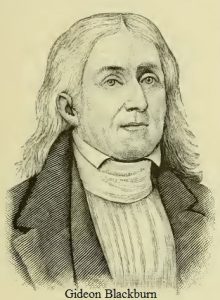 Evangelism among the native nations by pastors continued but it was in 1803 that the General Assembly of the Presbyterian Church in the United States of America (PCUSA) appointed its first minister responsible for Indian missions. He was Gideon Blackburn who was fittingly qualified for work among the Cherokees in rugged eastern Tennessee because his ministerial gifts were enhanced by frontiersman knowledge and skills. When he preached his Bible was in hand with a musket leaning against the pulpit. It had to be challenging to show compassionate gospel ministry to the Cherokees while keeping an eye out for one’s own safety. Blackburn not only provided pastoral ministry but also operated schools for the Cherokee children.
Evangelism among the native nations by pastors continued but it was in 1803 that the General Assembly of the Presbyterian Church in the United States of America (PCUSA) appointed its first minister responsible for Indian missions. He was Gideon Blackburn who was fittingly qualified for work among the Cherokees in rugged eastern Tennessee because his ministerial gifts were enhanced by frontiersman knowledge and skills. When he preached his Bible was in hand with a musket leaning against the pulpit. It had to be challenging to show compassionate gospel ministry to the Cherokees while keeping an eye out for one’s own safety. Blackburn not only provided pastoral ministry but also operated schools for the Cherokee children.
Following the Civil War both the PCUSA and the Presbyterian Church in the United States (PCUS) operated missions in the Indian Territory in what became Oklahoma in 1907. The Territory was established in conjunction with the Indian Removal Act of May 28, 1830 that was enacted during the administration of President Andrew Jackson. Relocation between 1830 and 1850 included over a hundred thousand members of the Cherokee, Creek, Choctaw, Chickasaw, and Seminole nations forced from their homes to the Territory with many dying along the way. Given the history of the Territory and resentment of these nations toward the Federal Government, the Presbyterians were challenged gaining the trust of those gathered on reservations in Oklahoma.
The PCUS experienced difficulties and setbacks with its missions in Indian Territory from about 1865 into the 1880s. The denomination determined that the best solution for handling the problems was to train native men for ministry among their own people. E. T. Thompson notes that by 1889 the PCUS had ten Indian clergy working with three missionaries to serve twenty-two churches. The greatest challenge was educating Native Americans for ordination, however, candidates from the Indian Territory most often grew up in Presbyterian schools and were better prepared for further study. Added to the challenges for missionaries was prejudice because the Little Big Horn massacre of George A. Custer’s troops in 1876 was still on people’s minds, and United States troops would continue fighting native peoples as the nineteenth century ended. Missionaries had to gain the Indians’ trust while suffering rebuke by their own people for ministering to those viewed only as enemies by many Americans.
Now, the subject turns to Joshua Bohannon. Unfortunately, the information accessed regarding his life is limited, so there are few facts to provide and some of his story is guess work. He was born in 1864 in the Choctaw Nation (lower right corner in the map), but his parents’ identities remain a mystery. It is possible he was an orphan, and his Bohannon surname was assigned to him by the orphanage, or he may have been adopted or sponsored by Bohannons. It is likely he attended one of the academies operated by missionaries on the reservation. His college studies were completed in two Presbyterian Church institutions. The first one was Arkansas College in Batesville, 1885-1887, and then he finished at Southwestern Presbyterian University, 1887-1890, which was at the time in Clarksville, Tennessee. B. M. Palmer was a member of the Southwestern University Board of Directors and at one point accepted an offer to become chancellor, but his presbytery would not release him from the call to First Church, New Orleans. Palmer was present at Bohannon’s graduation because he passed out awards to graduates that year and supplied the First Church pulpit.
The next step for Bohannon was seminary. The years after the Civil War saw the PCUS expand its educational program westward by opening the Divinity School at Southwestern in 1875. The seminary provided an ideal situation for Bohannon because he could remain in Clarksville studying for ordination and continue to be relatively close to his homeland. Shared use of the university campus eased operation of the seminary, nevertheless it struggled with low enrollment and funding shortages over the years. Among seminary faculty were James A. Lyon, Robert A. Webb (a pastor of Bethel Church, Clover, SC), Thornton Whaling, and William Addison Alexander. The Divinity School continued operations until its program was suspended in June 1917 because of dwindling attendance with the coup de grace being students abandoning studies to fight in World War 1.
For about a year during seminary studies Bohannon was a student missionary to the Choctaws and Chickasaws. He graduated with the class of 1893; was licensed by Nashville Presbytery of the PCUS; and then ordained by the Indian Presbytery, July 2, 1893. His call was to pastor churches in Bennington and Durant, Choctaw Nation. After all his preparation, he served his congregants for only six months dying in Durant December 22, 1893.
Even though the facts of Bohannon’s life are limited, thanks to a friend of his from Southwestern there was a memorial published in The Southwestern Presbyterian newspaper, January 11, 1894. The remembrance was signed “H.J.C.” which is likely Henry Joseph Compton (1851-1918) who became a minister in McComb, Mississippi.
In the death of this young soldier of the Cross, we are again brought to a realization of the fact that God’s ways are not our ways. Strange and sad as it may seem, that one in the bloom of youth, scarcely yet thirty years of age, and having but entered upon his life’s work, after spending seven years in preparing himself to preach the glories of his Master’s kingdom, should be thus suddenly taken away. His one hope and ambition was to preach the Gospel to his own people, but his ministry was of less than six months’ duration. His course was run, and the Master called him home to receive his crown….
Bro. Bohannon was loved and honored by all with whom he associated. He was a diligent and faithful student, a consecrated, conscientious Christian–in short, all that may be expected of a true Christian gentleman. His was of a noble disposition, not easily provoked to anger or impatience. The writer, having roomed with him for two years, never once saw his tranquil temper disturbed.
He had consecrated his life to the Master’s service; and often said if it were not for the great need in his own Territory, and his adaptability to that work, he would unhesitatingly go to the foreign field.
His life was full of promise, and he looked forward with joy to winning many souls to the Savior. He had just completed a home, but the Lord called him to the place prepared for him in the Father’s house. Had he lived, no doubt but that he would have won many precious souls; but his death may be the means of leading many prodigals back to the Father’s house. “No man dieth unto himself.” “He rests from his labors and his works do follow him.”
In the death of Bro. Bohannon, the Church has lost a valiant soldier. Who will rise up to take his place?
By this act of Providence, there are hearts that ache, hopes that are blighted, spirits that are crushed. May the comforts of the Gospel of “the Man of Sorrows, who was acquainted with grief,” be their portion in this dark hour of trial! “Blessed are they that mourn, for they shall be comforted.”
The PCUS General Assembly did not usually publish memorials for deceased ministers in its minutes, but Rev. Joshua Bohannon was remembered with a brief paragraph in the 1894 edition. As Bohannon’s memorialist noted in his heart-felt words in The Southwestern Presbyterian, God’s ways are not our ways. The Westminster Shorter Catechism in its answer to Question 11 says that,
God’s works of providence are his most holy, wise and powerful preserving and governing all his creatures, and all their actions.
But in the case of young Bohannon who followed his long road of preparation for ministry with cross-cultural challenges, more years of pastoral service would have made sense, humanly speaking. But maybe Rev. Bohannon’s relocation to his eternal home was the Lord’s reward for his brief but well-lived life.
Barry Waugh
Notes—The map in the header titled, “Indian Territory,” dated 1885 was issued by the United States General Land Company and is available from the New York Public Library Digital Collection. According to Nevin’s Encyclopedia of the Presbyterian Church, David Brainerd was ordained by the Presbytery of New York in June, 1744. The journal published by Edwards is, Reverend Mr. David Brainerd, Minister of the Gospel, Missionary of the Gospel, Missionary to the Indians, from the honorable Society in Scotland, for the Propagation of Christian Knowledge, and Pastor of a Church of Christian Indians in New Jersey. Who died at Northampton in New England, October. 9th 1747. in the 30th Year of his Age: Chiefly taken from his own Diary, and Other private Writings, written for his own Use, and now published, By Jonathan Edwards, A. M. Minister of the Gospel at Northampton. Boston: N. E. Printed for and Sold by D. Henchman, in Cornhill, 1749. Banner of Truth has reprinted the journal under the title, The Diary and Journal of David Brainerd with Notes and Reflections by Jonathan Edwards, 2007.
The portrait of Gideon Blackburn is from Nevin’s Presbyterian Encyclopedia. Information on Southwestern is from W. R. Cooper, Southwestern at Memphis, 1848-1948, Richmond: John Knox, Press, 1949, and from some catalogs of the university available online. The pages consulted in E.T. Thompson’s third volume of Presbyterians in the South are 71-77. The memorial for Bohannon from The Southwestern Presbyterian was provided by Wayne Sparkman, Director of the PCA Historical Center. The United States Congress admitted Oklahoma the sixteenth state November 16, 1907.
Other information was taken from issues of the Clarksville, Tennessee, newspaper, Daily Tobacco Leaf-Chronicle, for, May 20, 1890 (commencement announced); June 10, 1890 (graduation events); June 11, 1890 (Palmer information); and June 12, 1890 (Palmer preached at First Church).
Regarding PCUS missions work see, William B. Morrison, The Red Man’s Trail, Richmond: Presbyterian Committee of Publication, 1932.
Henry Joseph Compton (1851-August 4, 1918), Southwestern Presbyterian University & Divinity School, 1889-1894; ordained by New Orleans Presbytery, October 18, 1894; pastor in McComb, Mississippi 1894-99.
Note that other spellings for Bohannon include, Bohannan, Bohanon, and Bohanan. To read biographies of other missionaries to American Indians on Presbyterians of the Past, go to the posts about Thomas S. Williamson, Missionary Physician of Souls, and John Ross, Hoosier Presbyterians, Indiana.


